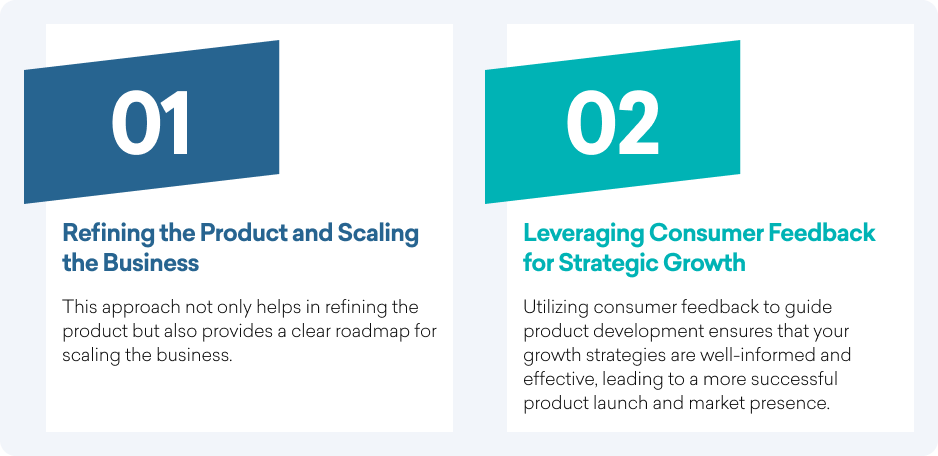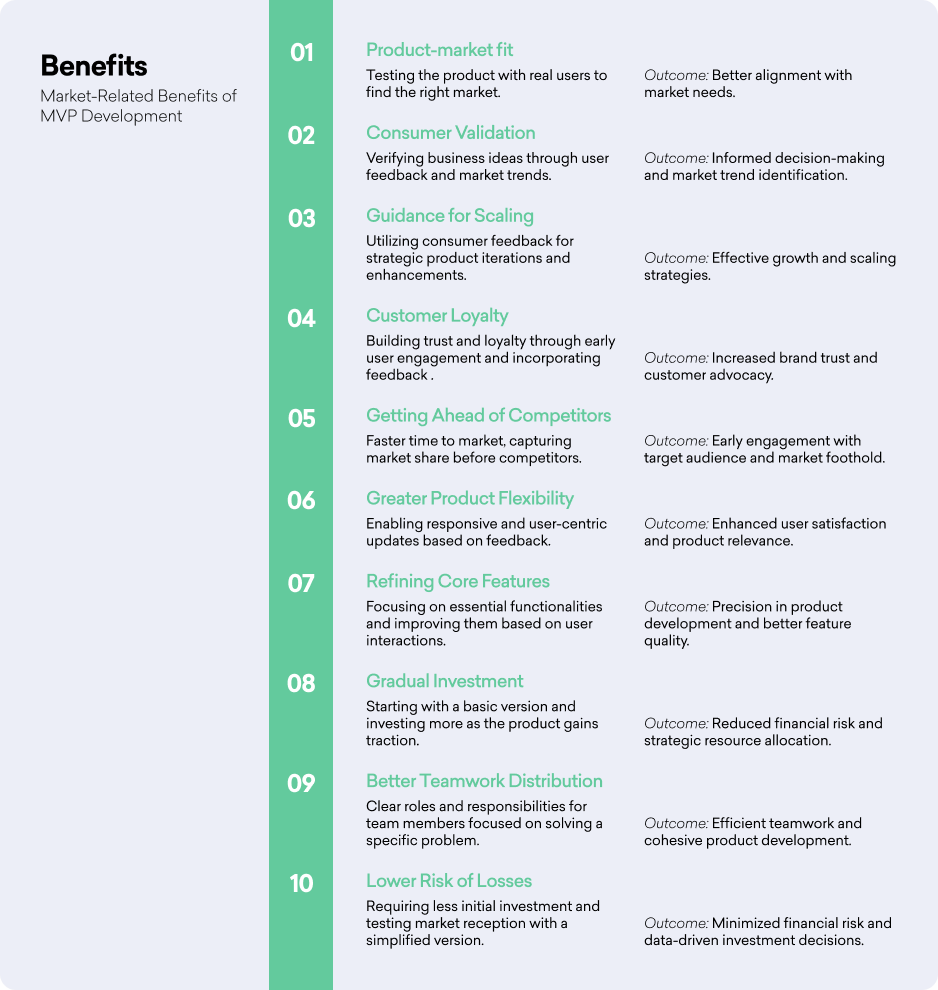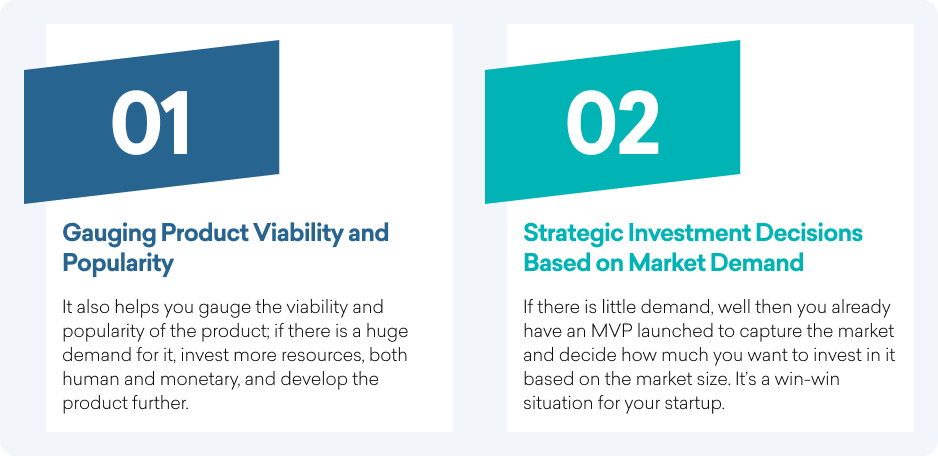Aspiring entrepreneurs often dream of creating the next big thing that disrupts an entire industry. We often hear about big companies only when they’ve made it, forgetting the long and difficult journey they undertook. For many such successful startups, the Minimum Viable Product (MVP) was an important stepping stone that paved the way for their achievements. According to CB Insights, approximately 38% of startups fail due to running out of cash, usually because they over-invest in fully developing products without first validating them in the market
Over the years, entrepreneurs have recognized the importance of an MVP as a strategy for launching products into the market. By focusing on core features, an MVP allows startups to test their ideas quickly and efficiently, gather essential feedback, and make necessary improvements. This lean approach minimizes risks, conserves resources, and accelerates time-to-market. While MVPs are crucial, it's also worth understanding mvp vs evp to explore different product development strategies. Here are ten reasons why startup MVP development is essential, highlighting its role in turning innovative ideas into successful ventures:
1. Product-Market Fit
An MVP is essential for finding the right market for your product. By launching a basic version of your product, you can test it with a real audience and gather feedback on its relevance and appeal. This helps you identify whether there is a genuine demand for your solution in the market.

The insights gained from early users enable you to make necessary adjustments to better align your product with market needs. In this way an MVP allows you to experiment and refine your product until you achieve a strong product-market fit so that your solution effectively addresses a real problem for a specific audience.
2. Consumer Validation
The MVP development process also assists entrepreneurs in verifying business ideas through real consumer interactions. By introducing a simple version of your product to the market, you can gather valuable feedback and make informed decisions based on actual user experiences. This process allows you to identify market trends and understand what features or aspects of your product resonate most with consumers.
Taking user feedback seriously and incorporating it into your development process makes sure that your product evolves in line with market demands, increasing its chances of success. Consumer validation through an MVP is an important step in ensuring that your product meets the needs and preferences of your target audience.
3. Guidance for Scaling
As consumers become familiar with your product through the MVP model for startups, their feedback can serve as a guiding light for future iterations. This continuous feedback loop helps you understand which features are most valuable to users and which areas need improvement. By iterating based on user input, you can make strategic enhancements that align with customer needs and market expectations.

This approach not only helps in refining the product but also provides a clear roadmap for scaling the business. Utilizing consumer feedback to guide product development in a way that guarantees that your growth strategies are well-informed and effective, leading to a more successful product launch and market presence.
Partner with Us for Success
Experience seamless collaboration and exceptional results.
Suggested Reads- What is MVP and How to Build One in 6 Steps
4. Customer Loyalty
Launching an MVP helps in building customer loyalty from the very outset. Early users provide necessary feedback and become advocates for your product, spreading the word and attracting more users. Their positive experiences can also attract investors, as a loyal customer base is a strong indicator of a product's potential success.
Additionally, initial users who see their feedback being incorporated into product improvements are more likely to develop a sense of trust and loyalty towards your brand. This early engagement not only enhances your product but also establishes a foundation of customer loyalty that can drive long-term success.

5. Getting Ahead of Competitors
Developing an MVP enables a faster time to market the product, allowing you to be the first to introduce your product to potential users. This first-to-market advantage can help you capture market share before competitors enter the scene. By launching quickly, you can start gathering user feedback early, which can be used to make timely improvements and stay ahead of the competition. Speed is crucial in the tech industry, and an MVP ensures that you don't miss out on early opportunities to engage with your target audience and establish a foothold in the market.

But the benefits do not end there. It also helps you gauge the viability and popularity of the product; if there is a huge demand for it, invest more resources, both human and monetary, and develop the product further. If there is little demand, well then you already have an MVP launched to capture the market and decide how much you want to invest in it based on the market size. It’s a win-win situation for your startup.
6. Greater Product Flexibility
An MVP allows for greater product flexibility, as it enables responsive and user-centric updates. By initially releasing a simplified version, you can quickly adapt and refine your product based on user feedback. The MVP development process guarantees that the product evolves to meet the changing needs and preferences of users.
Responsive updates not only enhance user satisfaction but also keep your product relevant in a dynamic market. Flexibility is one of the main advantages of the MVP approach, that allows your product to remain aligned with user expectations and market trends.
7. Refining Core Features
An MVP provides more time to adapt and refine core features based on real user interactions. By focusing on essential functionalities first, you can ensure that these features are up to standards and meet user needs. Plus, it allows you to focus on improving the features that users care more about. This precision in product development is what makes something successful and others a failure.
F22 Labs offers comprehensive MVP development services to guide you through this process. Whether you need help with MVP feature prioritization, understanding technical complexities, or wondering about the MVP cost, F22 Labs is here to help. Their expertise ensures that your MVP is well-developed, user-friendly, and ready for market validation.
8. Gradual Investment
Investing time and money in an MVP allows for more manageable scaling. By starting with a basic version of the product, you can gradually invest more as the product gains traction and user feedback guides further development.
This approach reduces the financial risk associated with full-scale product launches and allows for a more strategic allocation of resources. Gradual investment ensures that you can scale your product development in line with its market success, making it a more sustainable and financially prudent strategy.
Partner with Us for Success
Experience seamless collaboration and exceptional results.
9. Better Teamwork Distribution
The MVP model for startups helps improve teamwork distribution by focusing on solving a specific problem for users. This targeted approach ensures that each team member has a clear understanding of their role and responsibilities.
As the MVP evolves into a product that users like, the team can see the direct impact of their efforts, boosting motivation and collaboration. Clear roles and focused objectives lead to more efficient teamwork and a more cohesive product development process, ultimately resulting in a better product.

10. Lower Risk of Losses
Developing an MVP reduces the risk of losses by requiring less initial investment in terms of time and money. The simplified version of the product allows you to test market reception without committing extensive resources. Based on user feedback and market response, you can decide whether to continue developing the product or shut it down.
This approach minimizes the financial risk associated with new product launches and ensures that resources are only invested in products with proven potential. While many founders worry about how much it costs to build an MVP, they do not think about the losses they will prevent by mitigating the risk of a failed product that costs the company a fortune to build. Lower initial costs and the ability to make data-driven decisions that help protect your business from significant losses.

The Takeaway
If you have not heard of it, there is a saying that explains the importance of having an MVP development, “it’s a smart call to start small.” The marathon runner does not stand and think too much about the first step and similarly, as a company that aims to make it big in the long run, the first steps should focus more on the procedure and execution rather than how great the final product is. It is rare for any company to get their first product right, and many times it is right to make mistakes.
Recognizing the weak points in the early stages is much better than in the later stages as it provides more legroom for the company to improve upon the mistakes without requiring too much effort, capital, and loss of reputation. Just ensure that your startup gets all the steps right and takes the step in the first step. Know that the pursuit of perfection is a mistake as perfection is a journey rather than a destination.
